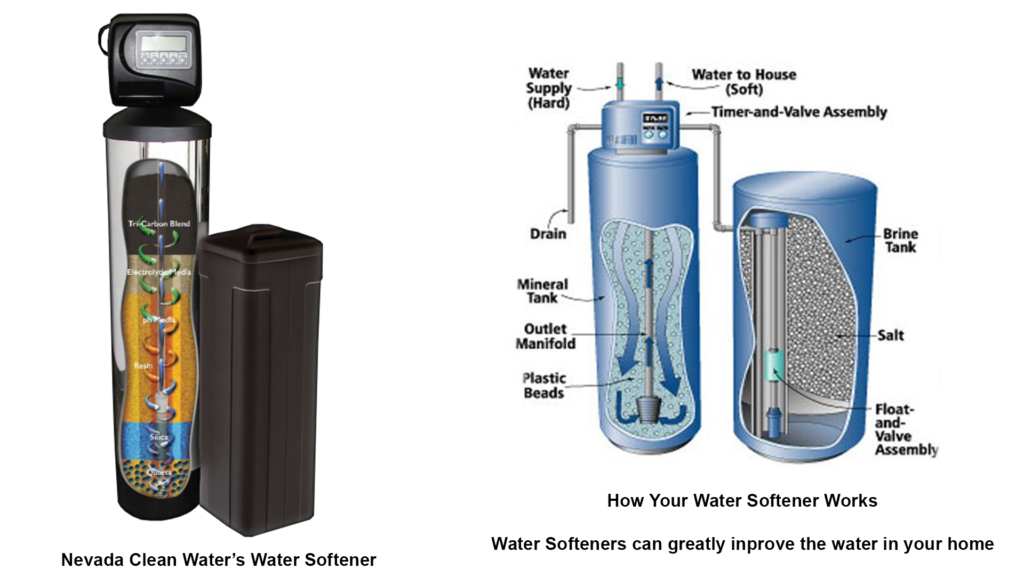
What is a Water Softener?
A water softener is an appliance that hooks up to the point where the water comes into the house and makes the water … you guessed it … softer!
But what is “soft” and “hard” water? The hardness or softness of water is determined by the amount of minerals in terms of calcium and magnesium. More of these minerals means “harder” water. The water softener removes calcium and magnesium from your water and replacing it with potassium or sodium, thereby making the water “softer”.
Do You Need a Water Softener?
Water softeners greatly increase the quality, taste and smell of water in your home. Water at a certain hardness may not taste or smell as good as softer water, and can potentially damage your home appliances and cause health defects. So, while you may not technically “need” one, if you have hard water, it is a good idea to install a water softener. Hard water can muck up a number of different important parts of your home such as sinks, toilets, showers, bathtubs and washers
Benefits of a Water Softener
The benefits of a water softener include:
· Reducing health defects
· Making your home’s water taste and smell better
· Making your appliances that use water (dishwasher, clothes washer, coffee maker, etc.) work better and last longer
· Having a water softener can help keep energy costs lower
· Improving the look and quality of your home’s water
· Reducing damage and clogging in your sinks, toilets, showers, bathtubs and washers
· Reducing your water usage
Is Your Home’s Water Too Hard?
The water hardness level that may warrant having a water softener is generally 7 grams per gallon of calcium and magnesium (GPG) or 120 milligrams per liter (mg/L). So, how do you know whether your home’s water is too hard?
To initially see if you may have hard water, simply fill a glass and look at it. If there’s a distinct lack of fluffy bubbles and the water appears cloudy and/or milky, your water is probably too hard. To find out exactly how hard it is in terms of mineral GPG, schedule a FREE In-Home Water Purity Test by Nevada Water Treatment by clicking HERE (Schedule FREE In-Home Water Test).
Signs that You Need a Water Softener
In addition to just looking at your water, there are other signs that indicate you need a water softener. These signs include:
1. Scale Buildup. If you see a white chalky substance on your faucets, this could be from limescale, which consists mainly of calcium carbonate (CaCO3). If it builds up, it can harm faucets and other components of your house through which your water runs. For example, scale buildup can seriously shorten the lifespan of your appliances by getting into and damaging the gears.
2. Visible Staining. White stains on your shower, sinks and other places your water runs through can be signs of hard water as well. The long-term solution is, of course, a water softener, but short-term solutions to this staining include cleaning with vinegar, bleach or detergent.
3. Faded Laundry.If the colors of your favorite clothes seem to be fading more quickly than they should, this could be a sign of hard water. In addition, hard water can make your clothes smell a bit not-so-fresh.
4. Dry Skin And Hair. High levels of hard minerals can also adversely affect the hydration and pH balance of your skin and hair. The most common side effect of this is dryness. If you’re feeling itchy or having a bad hair day, it could be your water.
5. Fragile Glassware. Hard water can cause glassware in dishwashers to become brittle and abrasive, and therefore easier to break. It can also cause staining on the glassware. These effects come from the calcium and magnesium levels being too high and the effect that has on glassware.
6. Constant Plumbing Issues. Limescale buildup doesn’t just affect appliances and faucets, it can also damage steel pipes and lead to leaks and water damage. Copper and PVC pipes are more resistant to scale buildup, so if you have those types of pipes, you’re in better shape with a water softener. Without one, hard water can result in frequent plumbing repairs that can be costly and affect the value of the home.
7. Malfunctioning Water Heater. Excess sediment in your water heater can absorb the water heat and accelerate the scale buildup that can cause malfunctions. In addition to testing for hard water, make sure you have your water heater maintained regularly.
8. Higher Utility Bills. Scale buildup doesn’t just damage pipes, it can clog them, too. When this happens, the system has to work harder to push water through, raising energy costs. So, investing in a water softener can help lower your electric bill.
Schedule a FREE In-Home Water Purity Test by Nevada Clean Water by clicking HERE (Schedule FREE In-Home Water Test).
Written by Robert Victor, January 20, 2021
Excerpts taken from Carey Chesney, Do You Need A Water Softener? 8 Signs That You Do